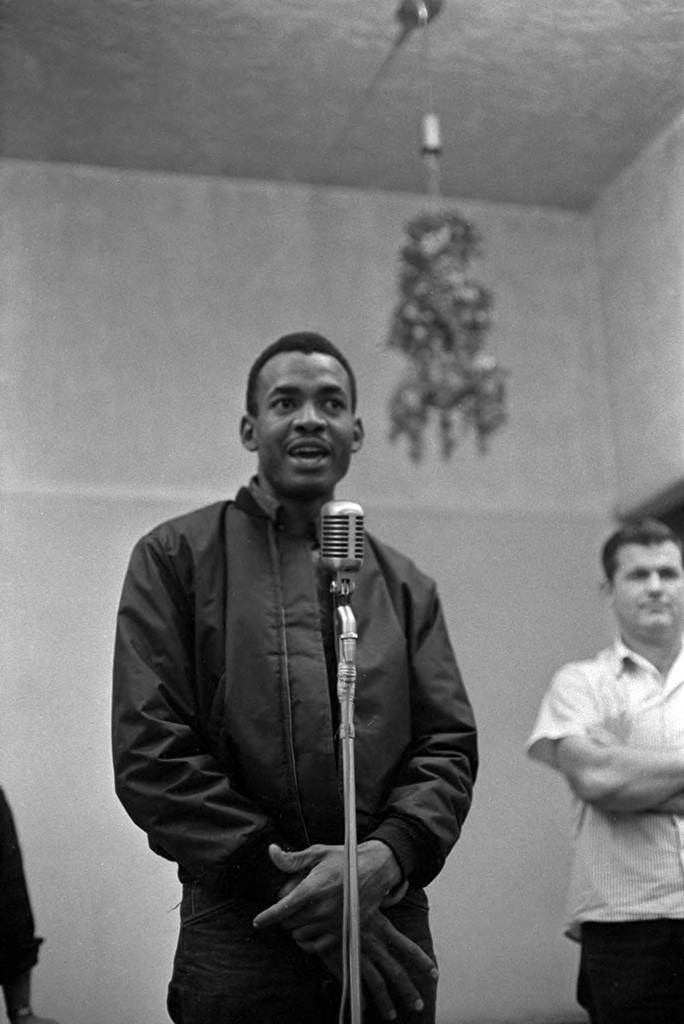Mack Lyons
Mack Lyons
UFW organizer Mack Lyons (right) leads a meeting at a union field office, Avon Park, Florida, 1972. Photo by John Kouns.
Mack Lyons (1941-2008) was born near Dallas, Texas to parents who worked in the Texas cotton fields, and later settled in California in 1965. He worked in Bakersfield driving a cotton-picking machine and a tractor. Later he took a job at the grape fields of DiGiorgio Fruit Corporation in Arvin.
After meeting NFWA organizer Marshall Ganz, he joined a delegation of workers who were arrested after refusing to leave a meeting with Robert DiGiorgio. After being released, they returned to DiGiorgio’s offices and were arrested again. Their protests forced DiGiorgio to hold elections. From 1966-1969, he worked in the valley organizing pickets and was elected as a union representative at the DiGiorgio Corporation for a very diverse group of workers composed of Mexicans, Filipinos, Puerto Ricans, and African Americans in Arvin.
Mack Lyons (right) and Adelina Gurrola sitting with other NFWA organizers, Delano, 1966. Photo by Emmon Clarke.
Mack Lyons speaking at a union meeting at Filipino Hall, Delano, Ca. 1966
Lyons soon became the only Black member of the UFW executive board. In 1971, César Chávez sent Mack and his wife Diana Lyons to work in Central Florida’s citrus belt in Avon Park, where UFW volunteers enlisted 75 percent of the workers at Minute Maid, a company owned by Coca-Cola. Following an election, the UFW became the union for Coca-Cola Minute Maid workers, leading to a groundbreaking three-year agreement in 1972. Despite modest resources, Manuel Chávez and Jerry Cohen negotiated a historic contract between Black, Mexican American, and white farm workers and the state’s largest citrus producer, marking Florida’s first citrus worker contract.
The UFW contract dismantled the crew leader system. Aside from improving wages and benefits, it introduced hiring halls which were crucial in restoring workers’ control over hiring practices. The UFW office in Florida was a former funeral parlor in Avon Park and it became a hiring hall and a service center where Mack and Diana Lyons administered the contract. In 1973, recognizing the significance of hiring halls for farm worker empowerment, growers lobbied for a “right to work” bill to revive the crew leader system. UFW organizers went to Tallahassee to oppose the bill. During a hearing, farm workers testified before the Sub-committee, recounting their captivity under their crew leaders. Ultimately, the bill was defeated. In 1975, renewing the Coca-Cola contract met obstacles, strikes were impractical due to replacement workers and limited funds, and boycott threats had lost credibility, leading the UFW to organize smaller protests, fasts, and sit-ins. Coca-Cola eventually renewed the contract in November, and in 1976 Mack and Dianna returned to Sacramento to support California’s labor legislation.
Tom & Ethel Bradley Center
California State University, Northridge
18111 Nordhoff Street, Northridge, CA 91330
Phone: (818) 677-1200 / Contact Us


